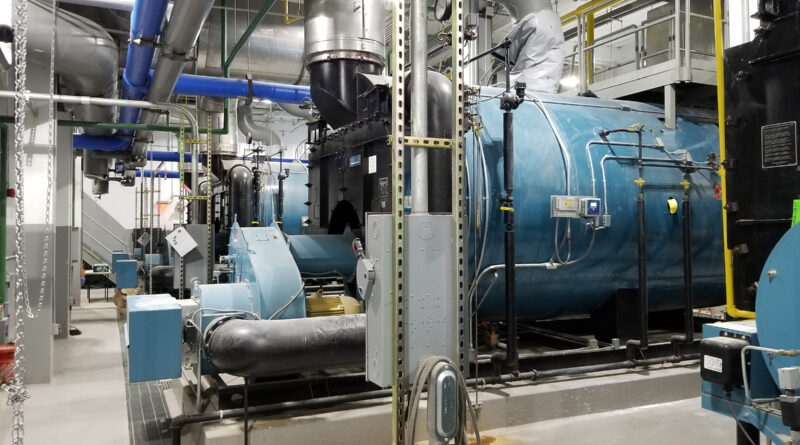$72 Million of Heating System Improvements Coming to Marble Hill and Berry Houses
On April 19, NYCHA and the New York Power Authority (NYPA) announced the start of construction on energy-efficient heating upgrades at Marble Hill Houses in the Bronx and Berry Houses on Staten Island. The $72 million projects will provide greater heat and hot water service for more than 4,000 residents across 2,100 public housing apartments – and reduce annual carbon emissions by nearly 2,200 metric tons (the equivalent of taking nearly 450 cars off the road). Once completed, the capital renovation projects will enable the Authority to contribute to the environmental goals of New York State’s Climate Leadership and Community Protection Act as well as New York City’s Climate Mobilization Act, which both call for greenhouse gas emissions from buildings to be reduced by 40 percent by the year 2030. NYCHA leveraged the design-build program to streamline the project delivery process for these projects, and utilized U.S. Department of Housing and Urban Development (HUD) funding as well as last year’s approval of the GDA Action Plan and City Capital Action Plan to finance construction. The upgrades are also part of NYCHA’s ongoing work to provide reliable and clean heat for residents, in line with the Authority’s 2019 Agreement with HUD.
“Modernizing NYCHA’s building infrastructure by incorporating more energy-efficient heating equipment is a beneficial way to reduce energy usage and lower carbon emissions,” said NYCHA Chair & CEO Greg Russ. “Our partnership with NYPA and support from across city, state, and federal levels of government will be instrumental in helping the Authority meet the goals of the Climate Leadership and Community Protection Act and the Climate Mobilization Act, while also addressing heating-related capital needs for these developments in the near term.”
“The heating improvements being implemented by the Power Authority at Marble Hill and Berry Houses will provide residents with more reliable and energy-efficient heat and hot water delivery,” said NYPA Interim President and CEO Justin E. Driscoll. “The upgrades will improve these systems at a critical time and help reduce carbon emissions, furthering the goals of Governor Hochul’s aggressive climate agenda.”
“Upgrades to the heating and hot water systems at Berry Houses and Marble Hill will provide energy-efficient, predictable services that NYCHA families can rely on,” said HUD Regional Administrator for New York and New Jersey Alicka Ampry-Samuel. “I am pleased to see that the Housing Authority and NYPA are taking action with advanced alternatives that will reduce carbon emissions and address years of deferred maintenance. These modifications also advance HUD-mandated actions in the settlement agreement, cost-effective improvements that will enhance the quality of life of NYCHA families.”
“Today’s announcement is a great step forward in modernizing NYCHA’s boilers, which we all agree is a critical quality of life priority,” said New York City Chief Housing Officer Jessica Katz. “NYCHA has been working across its portfolio to identify new revenue streams and innovative approaches to addressing its needs, and energy-efficient boilers not only gets us closer to giving residents the homes they deserve, but it also ensures NYCHA is doing its part in tackling the housing crisis.”
At Marble Hill Houses, NYCHA and NYPA will replace the current low-pressure steam boiler with a new, energy-efficient steam boiler system. The project will also see the de-coupling of existing hot water systems in 11 residential buildings and the installation of new, gas-fired water heaters to improve system reliability and reduce fossil-fuel emissions. The heating plant upgrades are expected to be completed in December 2023 and will total more than $41 million in investment.
At Berry Houses, the development’s low-pressure steam boiler will be replaced with a new, energy-efficient steam boiler system to supply reliable hot water to more than 500 apartments. The existing hot water system in each building will be de-coupled from the steam boilers and will be replaced with new, gas-fired water heaters. The Berry Houses energy-efficiency project is also expected to be completed in December 2023 and will total more than $31 million in investment.
The energy-efficient upgrades slated for Marble Hill and Berry Houses are the latest capital projects aimed at reducing the Authority’s carbon emissions footprint. In December 2021, NYPA, NYCHA, and the New York State Energy Research and Development Authority launched the Clean Heat for All Challenge (#CleanHeat4All) directed at heating and cooling equipment manufacturers to develop a new electrification product that can better serve the needs of existing multifamily buildings and hasten the transition to fossil-free heating sources.
NYCHA and NYPA are also partnering on a $28 million design-build electrification project to replace the aging gas-and-oil-fueled heating and hot water systems at 830 Amsterdam Avenue, a 20-story high-rise in Manhattan, with a high-efficiency electric Variable Refrigerant Flow (VRF) heat pump system. The project will provide central heating and cooling to all the building’s apartments, replacing the old, inefficient window air conditioning units.
The 2019 adoption of the Climate Leadership and Community Protection Act (CLCPA) by the New York State legislature and the Climate Mobilization Act by the New York City Council established bold mandates for achieving a clean energy and climate agenda. CLCPA commits private and public entities to a path of achieving a zero-emission electricity sector by 2040, including 70 percent renewable energy generation by 2030, and economy-wide carbon neutrality. At the local level, the Climate Mobilization Act aims to reduce emissions produced by the city’s largest buildings 40 percent by 2030 and 80 percent by 2050. The reduction targets for NYCHA are portfolio-wide rather than building-specific, and the Authority works closely with the NYC Department of Buildings, the Mayor’s Office of Sustainability, and other City agencies to meet this ambitious goal.
Photo caption: An example of a new boiler at NYCHA.

